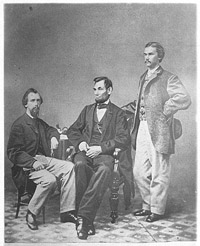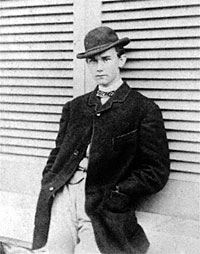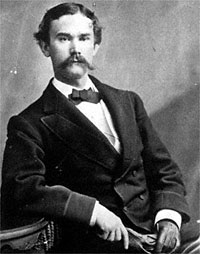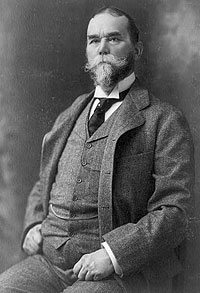 Lincoln’s private secretary was sometimes referred to as the President’s surrogate son. Before the newly elected President Lincoln left Illinois for Washington, he recruited two young men to fill the positions of Private Secretary to the Executive. One was a politically influential newspaper editor, John George Nicolay and the other was a younger law clerk named John Milton Hay. Both were talented and brilliant, Nicolay quiet, reserved and studious, Hay was outgoing, witty, charming and entertaining.
Lincoln’s private secretary was sometimes referred to as the President’s surrogate son. Before the newly elected President Lincoln left Illinois for Washington, he recruited two young men to fill the positions of Private Secretary to the Executive. One was a politically influential newspaper editor, John George Nicolay and the other was a younger law clerk named John Milton Hay. Both were talented and brilliant, Nicolay quiet, reserved and studious, Hay was outgoing, witty, charming and entertaining.
President Lincoln’s two Johns, would be tasked with writing letters, sorting mail, reviewing news articles, interviewing visitors and both would deliver personal messages for their Chief. Nicolay who was six years older than Hay, had a political sophistication and Lincoln often confided in the older John on matters of policy and strategy. The President and Hay had a unique relationship, that many observers felt was more like a father and son.
 John Milton Hay, born in 1838, in Salem, Indiana and was raised in Warsaw, Illinois. His family was fairly wealthy and John attended private preparatory schools and Brown University. After graduation, Hay moved to Springfield to study law and clerk with his uncle’s firm. After Lincoln’s election, Nicolay introduced Hay to the new President and insisted that the young clerk accompany them to Washington and become an assistant secretary to the Chief Executive. The two John’s shared a bedroom in the Presidential Mansion and were available night and day to assist, listen and advise Lincoln.
John Milton Hay, born in 1838, in Salem, Indiana and was raised in Warsaw, Illinois. His family was fairly wealthy and John attended private preparatory schools and Brown University. After graduation, Hay moved to Springfield to study law and clerk with his uncle’s firm. After Lincoln’s election, Nicolay introduced Hay to the new President and insisted that the young clerk accompany them to Washington and become an assistant secretary to the Chief Executive. The two John’s shared a bedroom in the Presidential Mansion and were available night and day to assist, listen and advise Lincoln.
President Lincoln took a special liking to the younger John. They shared jokes and stories, poetry and the classics and Hay served as a companion to Lincoln’s son, when Robert came home from school to visit his parents. Robert Todd Lincoln developed an intense jealousy of John Hay and his relationship with his father. John Hay and the President shared everything that Robert, never could or would, be able to experience paternally.
A Journalist of the day noted,
 “Hay knew the social graces and amenities, and did much to make the atmosphere
“Hay knew the social graces and amenities, and did much to make the atmosphere
of the war-environed White House grateful, tempering unreasonable aspirations,
giving to disappointed ambitions the soft answer which turneth away wrath,
showing, as Hamilton did in similar offices, the tact and common sense, which
were to serve him as they served Hamilton in wider spheres of public duty.”
One of John Hay’s talents that President Lincoln admired most was his ability to not only tell a story, but detail its content in writing. An entry from Hay’s diary on September 29, 1863 is an example,
“Today came to the Executive Mansion an assembly of cold-water men & cold
water women to make a temperance speech at the President & receive a
response. They filed into the East Room looking blue & thin in the keen
autumnal air; Cooper, my coachman, who was about half tight, gazing at them with
an air of complacent contempt and mild wonder. Three blue-skinned damsels
personated Love, Purity, & Fidelity in Red White & Blue gowns. A few
Invalid soldiers stumped along in the dismal procession. They made a long speech
at the President in which they called Intemperance the cause of our defeats. He
could not see it, as the rebels drink more & worse whiskey than we do. They
filed off drearily to a collation of cold water & green apples, & then
home to mulligrubs.”
A Lincoln family friend and local scribe related,
“Perhaps in all American public life nothing is more charming than the story of
the relations which existed between these two men, the one in the bloom of
youth, the other hastening toward his tragic end. Lincoln treated Hay with the
affection of a father, only with more than a father’s freedom. If he waked at
night he roused Hay, and they read together; in summer they rode in the
afternoons, and dined in the evenings at the Soldiers’ Home. In public matters
the older man reposed in the younger unlimited confidence.”
This type of release and levity was just the medicinal therapy that President Lincoln needed to relieve his constant melancholy.
 John Milton Hay was eventually appointed a Major in the Union Army and served for several months under the command of General David Hunter. It is also speculated that Hay could have been the original author of the Bixby Letter, a note of condolence from Lincoln to a grieving mother of 5 sons killed in the Civil War. The precocious John and Mary Todd Lincoln were at odds over security, protocol in the mansion and their continuing tension eventually led to Lincoln assigning Hay as a diplomat to Paris.
John Milton Hay was eventually appointed a Major in the Union Army and served for several months under the command of General David Hunter. It is also speculated that Hay could have been the original author of the Bixby Letter, a note of condolence from Lincoln to a grieving mother of 5 sons killed in the Civil War. The precocious John and Mary Todd Lincoln were at odds over security, protocol in the mansion and their continuing tension eventually led to Lincoln assigning Hay as a diplomat to Paris.
After Lincoln’s assassination, John Hay became a successful businessman, poet, author, ambassador and Secretary of State, in the administrations of Presidents McKinley and Roosevelt. A tour as Lincoln’s Private Secretary and the President’s Surrogate Son, not only helped the President weather the Civil War, but was a once in a lifetime opportunity for one of the two Johns.
Bummer


I wondered how Spielberg’s movie would depict Hay and Nicolay; it looked like they made Hay the more important of Lincoln’s secretaries. I always enjoyed the way John Huston played him as TR’s worldly, sophisticated advisor in “The Wind and the Lion;” Gore Vidal showed him in a similar light in a couple of his historical novels.
Louis
Hay and Nicolay had been prep chums before Brown. Folks were naturally attracted to Hay. A real charmer. Not much there on Nicolay. The “old guy” kept comparing the two
to Cohn and Shine of the McCarthy era.
Bummer
I guess, Bummer, except there’s no reason to see Hay and Nicolay as opportunistic, smarmy scum, which is how I see Cohn and Schine.
Louis,
You’re so right, didn’t mean to imply anything slanderous, just finished reading an essay about the “slicksters” and couldn’t get it out of my mind. Cohn was surly a legal prodigy and Hay proved his ability as he matured. Both Nicolay and Hay married and had children, not sure about Shine, but Cohn remained single and died painfully.
Bummer
At the risk of sidetracking your intended point with this post, I know that Cohn died of AIDS after a life of publicly denying he was gay when it was an open secret in Washington and New York. Don’t know about Schine but I thought he was gay too. That “dynamic duo” never showed credentials to run Foggy Bottom (the State Department).
Louis,
Always assumed that Shine was also, never read or heard any proof. McCarthy was not long on credibility and friends/supporters were hard to come by i.e. he may have been just lucky enough to get Shine and Cohn. Read that contemporaries referred to the threesome as Bonnie, Bonnie and Clyde.
Bummer